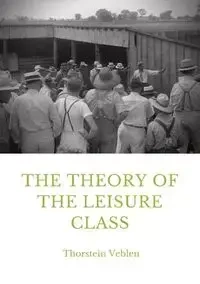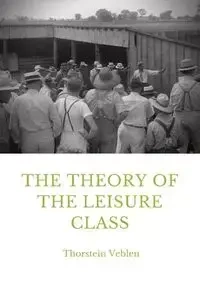The Theory of the Leisure Class - Veblen Thorstein
- An Economic Study in the Evolution of Institutions
The Theory of the Leisure Class: An Economic Study of Institutions (1899), by Thorstein Veblen, is a treatise on economics and a detailed, social critique of conspicuous consumption, as a function of social class and of consumerism, derived from the social stratification of people and the division of labour, which are social institutions of the feudal period (9th-15th c.) that have continued to the modern era.Veblen asserts that the contemporary lords of the manor, the businessmen who own the means of production, have employed themselves in the economically unproductive practices of conspicuous consumption and conspicuous leisure, which are useless activities that contribute neither to the economy nor to the material production of the useful goods and services required for the functioning of society, while it is the middle class and the working class who are usefully employed in the industrialised, productive occupations that support the whole of society.Conducted in the late 19th century, Veblen's socio-economic analyses of the business cycles and the consequent price politics of the U.S. economy, and of the emergent division of labour, by technocratic speciality - scientist, engineer, technologist, etc. - proved to be accurate, sociological predictions of the economic structure of an industrial society.The Theory of the Leisure Class: An Economic Study of Institutions (1899) presents the evolutionary development of human institutions (social and economic) that shape society, such as how the citizens earn their livelihoods, wherein technology and the industrial arts are the creative forces of economic production. That such production of goods and services was not merely the means of meeting the material needs of society, but of earning profits for the owners of the means of production. That the industrial production system required the workers (men and women) to be diligent, efficient, and co-operative, whilst the owners (businessmen and businesswomen) concerned themselves with making money and with the public display of their accumulated wealth and that such behaviours (conspicuous consumption and conspicuous leisure) survived from the predatory, barbarian past of the tribal stage of modern society.Originally published as The Theory of the Leisure Class: An Economic Study in the Evolution of Institutions (1899), the book arose from three articles that Veblen published in the American Journal of Sociology: (i) "The Beginning of Ownership" (ii) "The Barbarian Status of Women", and (iii) "The Instinct of Workmanship and the Irksomeness of Labour" (1898-99), which presented the major themes of economics and sociology that he later developed in works such as: The Theory of Business Enterprise (1904), about how incompatible are the pursuit of profit and the making of useful goods and The Instinct of Workmanship and the State of the Industrial Arts (1914), about the fundamental conflict between the human predisposition to useful production and the societal institutions that waste the useful products of human effort.
EAN: 9782382747599




The Theory of the Leisure Class: An Economic Study of Institutions (1899), by Thorstein Veblen, is a treatise on economics and a detailed, social critique of conspicuous consumption, as a function of social class and of consumerism, derived from the social stratification of people and the division of labour, which are social institutions of the feudal period (9th-15th c.) that have continued to the modern era.Veblen asserts that the contemporary lords of the manor, the businessmen who own the means of production, have employed themselves in the economically unproductive practices of conspicuous consumption and conspicuous leisure, which are useless activities that contribute neither to the economy nor to the material production of the useful goods and services required for the functioning of society, while it is the middle class and the working class who are usefully employed in the industrialised, productive occupations that support the whole of society.Conducted in the late 19th century, Veblen's socio-economic analyses of the business cycles and the consequent price politics of the U.S. economy, and of the emergent division of labour, by technocratic speciality - scientist, engineer, technologist, etc. - proved to be accurate, sociological predictions of the economic structure of an industrial society.The Theory of the Leisure Class: An Economic Study of Institutions (1899) presents the evolutionary development of human institutions (social and economic) that shape society, such as how the citizens earn their livelihoods, wherein technology and the industrial arts are the creative forces of economic production. That such production of goods and services was not merely the means of meeting the material needs of society, but of earning profits for the owners of the means of production. That the industrial production system required the workers (men and women) to be diligent, efficient, and co-operative, whilst the owners (businessmen and businesswomen) concerned themselves with making money and with the public display of their accumulated wealth and that such behaviours (conspicuous consumption and conspicuous leisure) survived from the predatory, barbarian past of the tribal stage of modern society.Originally published as The Theory of the Leisure Class: An Economic Study in the Evolution of Institutions (1899), the book arose from three articles that Veblen published in the American Journal of Sociology: (i) "The Beginning of Ownership" (ii) "The Barbarian Status of Women", and (iii) "The Instinct of Workmanship and the Irksomeness of Labour" (1898-99), which presented the major themes of economics and sociology that he later developed in works such as: The Theory of Business Enterprise (1904), about how incompatible are the pursuit of profit and the making of useful goods and The Instinct of Workmanship and the State of the Industrial Arts (1914), about the fundamental conflict between the human predisposition to useful production and the societal institutions that waste the useful products of human effort.
EAN: 9782382747599

